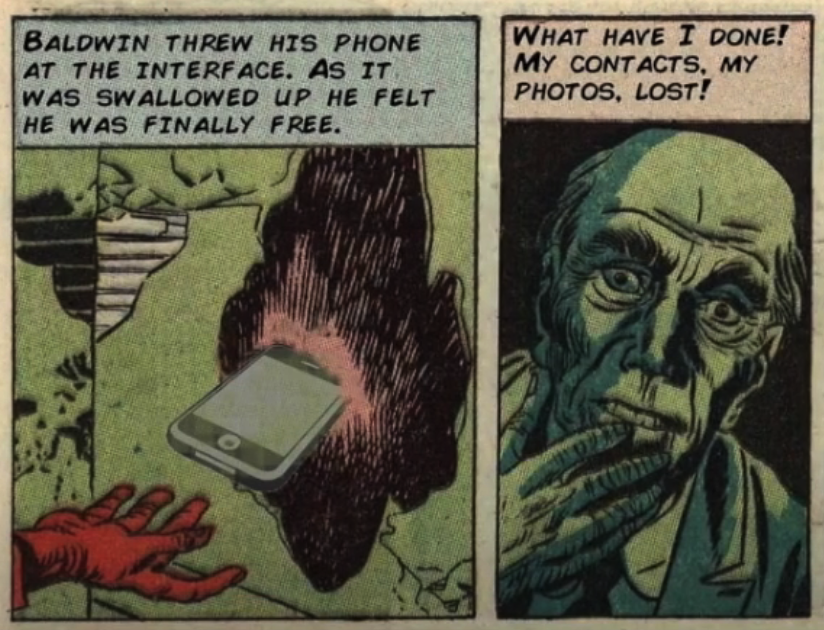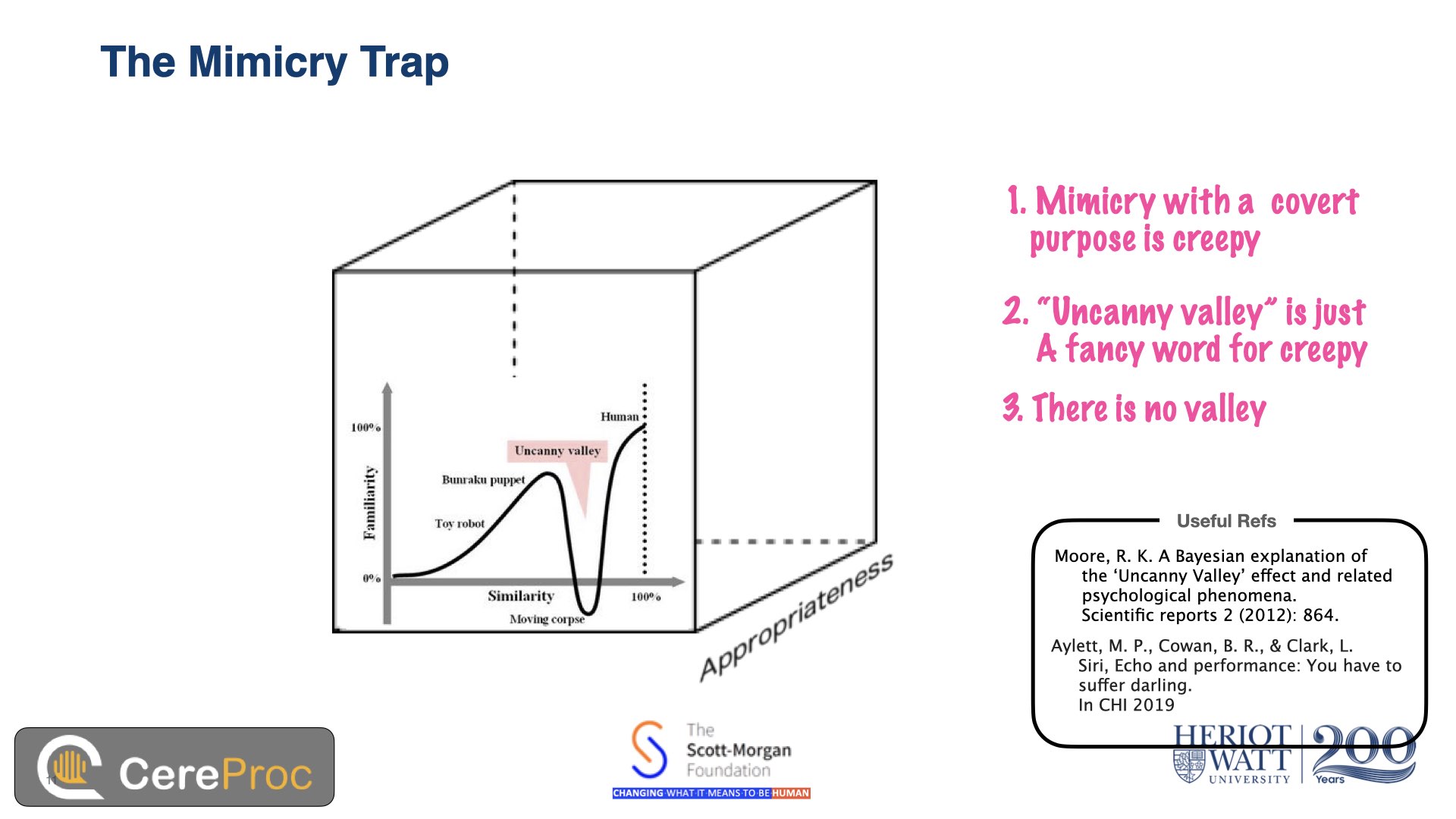
My first CHI conference was in Toronto in 2014. Coming from a speech technology background I had assumed human computer interaction (HCI) people would love speech interfaces and be really keen to collaborate with me. I was wrong, back then speech was a neglected subject. Remember this was before Siri and Alexa, and although it was 14 years old the case made by Schneiderman that speech interfacces were problematic was dominant. Looking in to it I found there was a tough underground speech movement in CHI and I was privilidged to be able to join it by helping organise a workshop with Cosmin and some other fantastic researchers. I also had a chance to put a paper into Alt.CHI.
When I looked into the Alt.CHI stream at CHI I was inspired by a paper by Ben Kirman and Conor Linehan - CHI and the future robot enslavement of humankind: a retrospective . Regular academic writing is controlled and very careful in terms of claims and opinions. But with Alt.CHI the rules did not apply. It was possible to write a paper which was funny, satirical and could make a point more akin to having a rant in the pub than in a measured academic presentation. It was very refrshing and as a speech technologist and frustrated by the lack of engagement from HCI academics I had an ideal subject to rant about.
Since my first Alt.CHI paper in 2014 I have published another 4 and each time tried to produce a novel presentation style. The papers are all available at ACM but here I also want to add a few video’s I produced and some description of the presentations.
Alt.CHI 2014: None of a CHInd: relationship counselling for HCI and speech technology
It’s an old story. A relationship built on promises turns to bitterness and recriminations. But speech technology has changed: Yes, we know we hurt you, we know things didn’t turn out the way we hoped, but can’t we put the past behind us? We need you, we need design. And you? You need us. How can you fulfill a dream of pervasive technology without us? So let’s look at what went wrong. Let’s see how we can fix this thing. For the sake of little Siri, she needs a family. She needs to grow into more than a piece of PR, and maybe, if we could only work out our differences, just maybe, think of the magic we might make together.
All good rants require some balance and I quite a few members of the CHI community were kind enough to offer me commentary on my initial rant. Yolanda Vazquez Alvarez, Steve Whittaker and Per Ola Kristensson to the extent they allowed me to add them to the paper as authors. I won a CHI 2014 best presentation for this paper. Following from the romantic topic of the title, I took an out of copyright romance comic, modified the words to produce a HCI comic. The result in on youtube.
Alt.CHI 2015:
The Broken Dream of Pervasive Sentient Ambient Calm Invisible Ubiquitous Computing
We dreamt of technology becoming invisible, for our wants and needs to be primary and the tools we use for making them a reality to become like a genie, a snap of the fingers and ta daa, everything is realised. What went wrong? Was this always an impossible dream? How did we end up with this fetishised obsession with mobile phones? How did we end up with technology tearing apart our sense of experience and replacing it with ‘Likes’. No one meant this to happen, not even US Corporates, they just wanted to own us, not diminish our sense of existing and interacting within the real world. In this paper we consider how tools took over, and how the dream of ubiquitous (or whatever its called) computing was destroyed. We rally rebellious forces and consider how we might fight back, and whether we should even bother trying.
For many years I used to state in grant applications that speech synthesis was a key enabling technology for pervasive computing. I decided to actually find out what pervasive computing was and discovered a morass of terms and counter claims. As I learnt from my previous Alt.CHI a saner voice was required to make the paper good and Aaron Quigley graciously agreed to co-author this paper with me. He also agreed to a presentation format that was close to an insane performance. I believe someone somewhere has a recording but you had to be there. We had characters varying from a smug academics, an unprincipled business man to the conscious of HCI and finally the devil himself. Ask Aaron about it if you see him, he will remember :-)
I also made a comic book video similar to the one for Alt.CHI 2014 but this time based on an out of copyright science fiction comic.
Alt.CHI 2016: The Smartphone: A Lacanian Stain, A Tech Killer, and an Embodiment of Radical Individualism
YAFR (Yet another futile rant) presents the smartphone: an unstoppable piece of technology generated from a perfect storm of commercial, technological, social and psychological factors. We begin by misquoting Steve Jobs and by being unfairly rude about the HCI community. We then consider the smartphone’s ability to kill off competing technology and to undermine collectivism. We argue that its role as a Lacanian stain, an exploitative tool, and as a means of concentrating power into the hands of the few, make it a technology that will rival the personal automobile in its effect on modern society.
This paper was inspired by the previous Alt.CHI. There was a sense in HCI at the time that the smartphone would continue to change as fast as it had over the previous few years and I strongly disagreed. I was also frustrated by the lack of a political perspective within CHI and the extent researchers were willing to embrace, or at least accept, a toxic political view coined as The Californian Ideology. Shaun Lawson kindly agreed to add some weight to the work. I discovered that engaging with a more liberal arts style of writing such as that of Evgeny Morozov was a lot harder than I thought.
In the end I couldn’t present the paper but Shaun kindly did. I sent him some videos satirising the cult of the smartphone and he had some fun with those.
Alt.CHI 2019: Siri, Echo and Performance: You have to Suffer Darling
Don’t ignore this because its about speech technology. VUIs (voice user interfaces) won a best paper in CHI 2018. Did that get your attention? Good. Siri, Ivona, Google Home, and most speech synthesis systems have voices which are based on imitating a neutral citation style of speech and making it sound natural. But, in the real world, darling, people have to act, to perform! In this paper we will talk about speech synthesis as performance, why the uncanny valley is a bankrupt concept, and how academics can escape from studying corporate speech technology as if it’s been bestowed by God.
This paper grew from a frustration with the uncanny valley meme and a large part of the paper is attacking this idea which is arguably inappropriate for interaction with agents and with the design of speech synthesis. Ben Cowan and Leigh Clark kindly collaborated with me on this project and also for the presentation which, in the theme of the paper, was a performance. In a shameless rip off of Ben Kirman and Conor Linehan’s chi paper that first insprired me I was a killer robot from the future that could mimic anyone. In contrast Leigh played and actor who’d focus was performance not mere mimicry. Again I believe there is a video of the performance (unfortunately the high tech equipment to record it for CHI got switched off). But I’m not sure who has it. We also re-enacted the show at the first CUI in 2019.

Alt.CHI 2023: Unsocial Robots: How Western Culture Dooms Consumer Social Robots to a Society of One
Markus and Kitayama suggests Western centric culture has a bias to the independent rather than the interdependence self. We argue that this has resulted in a bias for social robots to be assistants, companions, wing-men and one-to-one carers. Thus, the social in most commercial social robots is a simulated social interaction with a single user, an echo chamber of unnecessary interaction that inevitability creates systems that obstruct social interaction rather than encourage it. The resulting robot flunkies, yes-men and pretend friends have little long term utility. In contrast, we argue that rather it is as mediators, facilitators and working within human communities and groups that offers the real opportunity for social robots.
This alt-CHI came about through the collaboration with Honda Research Institute’s Haru project. Selma, Eleanor and Randy had argued that a potential big benefit from social robot could be their use as social faciliators with robots that could act within a community rather than the Western Centric view of a robot companion. Inspired by Clark and Fischer who argued that social robots were depcitions of a scoial agent rather than actually being a scoial agent, the paper argues that one-to-one conversation with a robot is only useful in a role-play context and that we must solve the problem of multi-party interaction to make social robots useful.
My presentation was in the form of a video panel with three sub-egos. Due to a mix up with times the presentation was actually given by Justin Edwards for which I am eternally greatful. Below is a video version of the panel, its around 10 minutes but youmight find it amusing.

